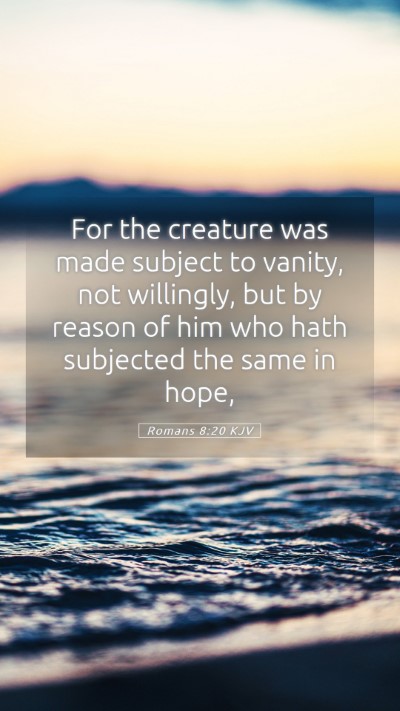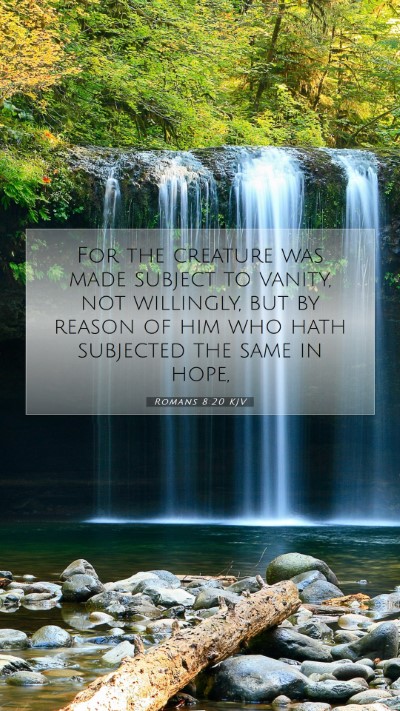Understanding Romans 8:20
Romans 8:20 states: "For the creation was subjected to futility, not willingly, but because of Him who subjected it, in hope." This verse holds significant meaning within the context of biblical teaching and warrants careful exploration for those seeking bible verse meanings and bible study insights.
Bible Verse Explanation
This verse addresses the state of creation in relation to sin and the fall of mankind. Matthew Henry explains that the creation was subjected to futility as a consequence of human sin—reflecting God's sovereign decision rather than an act of rebellion from creation itself. Understanding this aspect highlights both the gravity of sin and the overarching purpose of redemption through Jesus Christ.
Albert Barnes further elaborates on the term "futility," emphasizing that the creation is in a state that does not fulfill its intended purpose because of the curse introduced by sin. This underlines a profound truth: while creation suffers, it also eagerly awaits liberation and restoration through hope.
Adam Clarke provides additional insight by noting that the phrase "not willingly" signifies that creation was not at fault in its subjection. This bears relevance to discussions in bible study groups and online Bible study, where participants can delve into the nuances of divine sovereignty and human responsibility.
In-Depth Scripture Analysis
The context of Romans 8 is pivotal to grasping this verse's meaning. It deals with the hope of glory and the future restoration of all things (Romans 8:18-23). The entire passage weaves a narrative of struggle, hope, and divine purpose. Those seeking bible verse interpretations will find rich theological implications here for both individual lives and communal experiences within Bible study resources.
- Creation's Hope: The verse expresses the intrinsic longing of creation for redemption, indicating a promise that goes beyond current suffering.
- Divine Sovereignty: Emphasizing that God is in control, underscoring the importance of faith during trials.
- Connection to Human Experience: The futility experienced in life parallels the spiritual struggles believers face, enriching our understanding of Scripture.
Cross References
To enrich your understanding of Romans 8:20, consider these related passages:
- Genesis 3:17-19: The curse on the ground and the futility experienced as a direct consequence of sin.
- Isaiah 24:5: Prophecies regarding the earth's suffering reflected in its state of corruption.
- 2 Peter 3:13: The promise of a new heaven and a new earth where righteousness dwells.
Application of Romans 8:20 in Daily Life
As followers of Christ engage in bible study lessons and reflections on their struggles, Romans 8:20 can serve as a reminder of the transient nature of current suffering. It encourages believers to maintain hope and look forward to the ultimate restoration and renewal of creation, as well as their own lives.
This verse can be effectively applied in various bible study topics, fostering discussions around the nature of suffering, God’s omnipotence, and the promise of eternal life.
Conclusion
Romans 8:20 offers profound insights into the nature of creation and God's redemptive plan. By engaging with this verse through commentary and exegesis, believers can enhance their bible verse understanding and cultivate a deeper relationship with Scripture. This exploration can be a springboard for bible study tools used in personal or group settings, leading to transformative insights about the hope we have in Christ amidst a fallen world.


